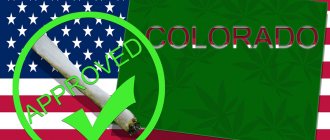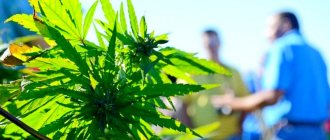— Tell your friends about the project
Attitudes towards marijuana differ in different countries of the world. Thus, in the Netherlands there are active discussions about allowing the cultivation of cannabis at home, and in Germany they have already allowed it to be taken for medical indications. Israel is not lagging behind in this regard, wanting to replace criminal liability for marijuana use with a fine in the near future. In the United States, cannabis (this is also what marijuana is called) is treated very favorably - in two dozen states it is allowed to be taken according to medical prescriptions, and in one state they even allowed hemp to be grown, sold, and smoked for this purpose. Russia takes a strong position regarding hemp, having included the plant from which marijuana is made into the list of crops prohibited for cultivation and sale.
Is it possible to grow hemp for personal use?
Federal Law No. 3 clearly establishes a ban on the cultivation of narcotic plants for any purpose. Since cannabinol is contained even in hemp seeds, it cannot be grown.
There is also a list of prohibited plants No. 934, in which this plant also appears.
The qualification of violation of these prohibitions depends on the number of plants:
- Less than 20 bushes are considered insignificant in size. Responsibility will arise under Article 10.5.1 of the Code of Administrative Offenses of the Russian Federation. This article provides for a fine of 1.5-4 thousand rubles or arrest for 15 days.
- When growing more than 20 bushes, liability will arise under Article 231 of the Criminal Code of the Russian Federation. They can be punished with a fine (up to 300 thousand rubles), compulsory labor (up to 480 hours), restriction or imprisonment (up to 2 years). However, if the crime is committed by several people, the prison term will increase to 8 years with a possible additional restriction of freedom for 2 years.
- Particularly large size (more than 330 bushes) is punishable under the same article 231, but only by imprisonment for 8 years. Even a small sprout of hemp is considered a bush.
Answering the question whether it is possible to grow hemp, it becomes clear that liability is provided for by law in any case and often a “lover” of weed can be imprisoned for a long time.
Responsibility for growing hemp in 2021
The Criminal Code of the Russian Federation has a separate article numbered 231, which clearly states the punishment for the illegal cultivation of drug-containing plants.
Thus, for breeding and growing cannabis on a large scale, the perpetrator or perpetrators may face the following punishment:
- monetary penalty of up to 300 thousand rubles;
- performance of free work by a convicted person in his free time from his main place of work for a period of up to 480 hours;
- restriction of freedom of a convicted person for up to 2 years;
- imprisonment for up to 2 years.
The punishment for growing cannabis will be harsher if:
- A group of people were engaged in illegal activities.
- The attacker was engaged in the cultivation of prohibited grass on an especially large scale.
In these cases, the perpetrators will face the following punishment:
- imprisonment for a term of up to 8 years with restriction of freedom (up to 2 years) or without such restriction.
What is meant by the term “large” and “extra large” size in hemp cultivation cases?
In the Decree of the Government of Russia No. 1002 of October 1, 2012, as amended on June 22, 2018, “On approval of significant, large and especially large amounts of narcotic substances,” in the paragraph where cannabis, also known as marijuana, is listed, the following meanings are established:
- significant size - over 6 grams;
- large size - over 100 grams;
- especially large size – over 100 kg.
Can they be planted for buying or selling hemp seeds?
Since hemp seeds also contain a narcotic substance, albeit in small quantities, there is also liability for trading in them.
Government Decree No. 460 of 2007 approved a list of permitted hemp varieties that contain a minimum cannabinol content. Such varieties can be sold, but only for industrial purposes, and if there are documents confirming that the seeds belong to this particular variety.
The following gradation has been established for the THC (tetrahydrocannabinol) content in hemp seeds:
- Significant size - more than 0.05 grams.
- Large size - more than 0.25 grams.
- Particularly large - more than 50 grams.
According to the size, the punishment for selling seeds differs.
The government allowed the cultivation of hemp and opium poppy for industrial purposes
Russian Prime Minister Mikhail Mishustin signed a decree lifting the ban on the cultivation of hemp and poppy for industrial, medical and veterinary purposes. Plant seeds for planting will be entered into the state register.
The State Duma and the Ministry of Industry and Trade have long called for lifting the ban on growing opium poppy for the production of medicines. This is necessary to replace imported raw materials, the department indicated.
Among the 13 registered opium-based drugs, nine are included in the list of vital and essential drugs (VED),
said member of the State Duma Committee on Health Protection Alexander Petrov.
Morphine isolated from poppy is, in particular, used in the production of painkillers, explains Nikolai Bespalov, development director of the analytical company RNC Pharma. Now it has to be imported mainly from Spain. Over the 11 months of last year, about 150 kg of it were delivered to Russia.
Confectioners will also be able to switch to domestic ingredients. In accordance with the resolution, for industrial production it is permitted to use varieties of sleeping pills containing in the dry mass of parts of one plant a total mass fraction of codeine, morphine, oripavine and thebaine in an amount not exceeding 0.6%. Imports of edible poppy seeds into the country annually reach 8 - 13 thousand tons.
As Bespalov notes, starting to grow poppy in Russia on an industrial scale is not difficult: “This is a common, routine procedure, but it requires certain costs, time, and energy.”
However, it is clear that the criteria for allowing companies to grow poppies will be very strict. Only a limited number of state-owned enterprises with a license will be allowed to do this. Perhaps even alone, says Oleg Berezin, head of the group for work with life sciences and healthcare companies in the CIS at Deloitte.
“This does not mean any legalization of the production and consumption of these currently prohibited substances,” the expert points out.
As emphasized in the government decree, it is still prohibited to grow poppies of the second and subsequent reproductions.
Hemp instead of plastic
Unlike poppy, hemp has been grown as an agricultural crop in Russia since 2007. This is permitted by Russian Government Decree No. 460 dated July 20, 2007 “On the establishment of varieties of narcotic plants permitted for cultivation for industrial purposes, requirements for such varieties and the conditions for their cultivation.”
In the document signed by the prime minister, officials additionally prescribed a hemp variety that can be grown on an industrial scale.
Government Decree No. 101 specifies a “non-narcotic” variety of hemp (the so-called “industrial hemp”) containing in the dry mass of leaves and inflorescences of the upper parts of one plant a mass fraction of tetrahydrocannabinol (THC) in an amount not exceeding 0.1%. THC determines the concentration of the drug in the plant. The cultivation of cannabis varieties of the fourth and subsequent reproductions remains prohibited.
On the Russian market, the plant is actively used to produce a number of products.
For example, oils from the plant are popular. Edible hemp seeds are actively sold in health food stores.
They are advertised as a dietary product that helps cleanse the body.
Another popular confectionery product is pasta made from hemp flour. It is touted as a healthy and nutritious product with a “light hint of hemp seed flavor.”
Textile products made from the plant are also popular among hobbyists. These are, for example, clothes and shoes made from hemp fiber, bed linen, bags, and accessories. It is believed that such textiles are less deformed and last longer.
A specialized uniform using hemp fibers is produced for the needs of the People's Liberation Army of China (PLA). The country as a whole accounts for almost half of the world's legal cannabis production. However, in Russian climatic conditions, such a military uniform would be unsuitable, Vladimir Kadenko, general director of OJSC 43 Central Experimental Sewing Plant (43 TsEPK), admitted in an interview with RIA Novosti.
Hemp is also in demand in construction. So, you can now find “strong” ropes made from the plant on sale. Hemp insulation is also in demand.
Environmentalists have long dreamed of how hemp could replace traditional plastic. The Kurgan region has already promised to start producing biodegradable packaging based on “composite material made from hemp.” No waste, no carbon emissions, advertised her project.
“We will produce pulp, paper, fabrics, fertilizer, biofuel, biodiesel and other products from processed hemp,” promised project curator Marina Dmitrieva.
The first products from the company, which announced its plans in 2019, could appear within two years.
Theoretically, hemp-based products in Russia could replace both plastic bags and disposable plastic tableware, manufacturers say.
Today, hemp products are sold mainly in specialized stores; mass retail chains are afraid to stock products with the image of hemp. In 2021, law enforcement agencies fined a Moscow restaurant 840 thousand rubles because of beer with the image of cannabis. It was presented on the menu. His description was recognized as propaganda of narcotic drugs (Article 6.13 of the Administrative Code).
More domestic
Some products today are made from domestic raw materials, but most are made from imported ones. According to statistics, hemp crops in Russia have been growing in recent years. In 2021 they exceeded 10 thousand hectares. In 2021 there were significantly fewer of them - 4.5 thousand hectares. And in 2016 it was about 2.6 thousand hectares.
Hemp is grown in Mordovia, Adygea, as well as the Oryol, Penza, Novosibirsk, Kursk and Nizhny Novgorod regions.
During the Soviet years, almost 1 million hectares of hemp were grown.
However, we are unlikely to achieve such volumes in the near future. A government decree may stimulate an increase in hemp crops to a maximum of 20-30 thousand hectares in the coming years, an industry expert explains in an interview with Gazeta.Ru.
We need to create more incentives for farmers.
“Hemp is a very labor-intensive and high-cost crop,” continues the expert. According to him, its development requires huge investments of public funds. This requires a full-fledged state program to support farmers. But she's gone now.
If we aim to produce hemp on an industrial scale, it is also necessary to purchase more harvesting equipment and build processing plants, adds Gazeta.Ru’s interlocutor.
As Sergei Belopukhov, head of the Roslenkonoplya project, previously told Agroinvestor, the business of producing and processing industrial hemp seeds and fiber pays off in no less than 7-10 years.
What is the deadline for purchasing hemp seeds?
The buyer of seeds whose THC content exceeds the established standards will be prosecuted under Article 228 of the Criminal Code of the Russian Federation.
With a significant amount of THC content, it faces:
- Fine up to 40 thousand rubles.
- Mandatory work up to 480 hours.
- Correctional labor for up to 2 years.
- Restriction and imprisonment for up to 3 years.
A large amount entails imprisonment from 3 to 10 years with an additional fine of half a million rubles, as well as restriction of freedom for a year.
A particularly large amount is grounds for imprisonment for 10-15 years, with an additional fine in the amount of 500 thousand rubles and restriction of freedom for 1.5 years.
In the event that the amount specified by law is not exceeded, the buyer will only be brought to administrative liability under Article 6.8 of the Code of Administrative Offenses of the Russian Federation. In this case, a fine (4-5 thousand rubles) or arrest for up to 15 days may be applied as punishment.
Thus, you need to understand that not only is there an article for growing hemp, but also for purchasing its seeds you can get a real prison sentence.
What is the deadline for selling hemp seeds?
The seller of seeds of prohibited varieties of cannabis will be punished more harshly than the buyer. Article 228.1 of the Criminal Code of the Russian Federation provides for imprisonment for 4-8 years with an additional restriction of freedom for 1 year.
However, there are aggravating circumstances:
Have a question for a lawyer? Ask now, call and get a free consultation from leading lawyers in your city. We will answer your questions quickly and try to help with your specific case.
Telephone in Moscow and the Moscow region: +7
Phone in St. Petersburg and Leningrad region: +7
Free hotline throughout Russia: 8 (800) 301-39-20
- Sales to educational institutions, public and government institutions, recreational facilities, transport and correctional institutions.
- Use for selling media and information networks.
In these cases, the term of imprisonment will be assigned within the range of 5-12 years, with a possible additional fine of 500 thousand rubles and a year of restriction of freedom.
Trafficking by a group of people, as well as the significant amount of THC in the seeds, is also an aggravating factor. This is punishable by imprisonment for up to 15 years with a limit of up to 2 years.
Use of official position, as well as large and especially large amounts of THC content can lead to a 20-year prison sentence, a fine of one million rubles, as well as an additional ban on working in a specific area for 20 years.
What is the punishment for using weed?
In addition to punishment for growing hemp, Russian legislation provides for liability for its use. This responsibility is quite mild; the consumer will be punished under the Administrative Code. However, you need to remember that there is criminal liability for possession of marijuana or hemp.
Under the Code of Administrative Offences, the following may be punished:
- Under Article 6.9 for using drugs at home. This will result in a fine of 4-5 thousand rubles or arrest for 15 days. Foreigners will face deportation.
- Under Article 20.20 for consumption in a public place. The punishment is identical to the previous article.
- According to Article 20.22, if a minor used cannabis in a public place. Parents or guardians will be required to pay a fine of 1.5-2 thousand rubles.
Unlike criminal liability for more serious drug-related crimes, administrative penalties are quite mild.
What can you get for distributing marijuana?
Today in our state, an attempt to grow, cultivate and sell hemp implies an administrative fine or criminal punishment. It should be clarified that the concept of cultivation means the cultivation of drugs and the production of new varieties that are resistant to different weather conditions.
Marijuana can be cultivated only with state permission for the purpose of scientific development.
In Art. 6.8 of the Code of Administrative Offenses of the Russian Federation establishes administrative penalties for the possession and sale of marijuana. Art. 6.9 of the Code of Administrative Offenses of the Russian Federation stipulates a ban on the transportation, storage and circulation of plants with psychotropic effects, as well as their use without an official prescription from a doctor.
For cultivating the prohibited crop described above, punishment is also implied. Criminal prosecution for activities with cannabis is established in the following articles:
- Art. 231 of the Criminal Code of the Russian Federation provides for punishment for cultivating a plant.
- Art. 228 of the Criminal Code of the Russian Federation warns of criminal liability for storing, transporting and purchasing marijuana.
- Art. 228.1 of the Criminal Code of the Russian Federation determines [the term for marijuana].
- Art. 230 of the Criminal Code of the Russian Federation stipulates liability for deliberate inducement to take marijuana.
Criminal liability for marijuana
For a number of actions with marijuana, Articles 228 and 228.1 of the Criminal Code of the Russian Federation provide for punishment. The following actions are criminally punishable:
- Manufacturing and processing of drugs.
- Storage.
- Transportation.
- Distribution, including free.
It is important to understand that while there is no criminal penalty for the use of marijuana, there is one for its possession. In practice, it is difficult to imagine use without storage.
What weight of marijuana is punishable by criminal charges?
According to Government Decree No. 1002, the following quantities of stored drugs are established, on the basis of which a specific punishment is assigned:
- Significant size - 6 grams.
- Large – 100 grams.
- Extra large – 100,000 grams.
The punishment can be significantly increased in case of large and especially large quantities of drugs seized.
Punishment for possession of marijuana
As mentioned above, the punishment depends on the size of the drug stored:
- If the amount is significant, the maximum penalty is imprisonment for up to 3 years. But more often they impose correctional, compulsory labor, a fine or restriction of freedom.
- If the amount is large, imprisonment will be mandatory - up to 10 years. Additionally, a fine of up to 500 thousand rubles will be applied and freedom will be limited for a year.
- A particularly large size will result in a sentence of 10 to 15 years. If there are mitigating circumstances, the court may limit itself to the minimum figure.
The law defines only one way to avoid liability - to hand over marijuana to the police voluntarily.
Punishment for distribution of marijuana
Selling any drugs is the most serious crime. The fact that marijuana is a so-called soft drug does not reduce the degree of punishment:
- According to the first part of Article 228.1 of the Criminal Code, sales will be punished with 4-8 years in prison.
- The significant amount of the drug increases the possible sentence to 8-15 years.
- Large size - up to 10-20 years.
- Particularly large - up to 15-20 years.
If a criminal sold drugs in public places or through the media, then even with a minimal quantity, the prison term is determined within 5-12 years.
Responsibility for the illegal cultivation and cultivation of narcotic plants.
Date of: 07.09.2020 15:31
State policy in the field of trafficking in narcotic drugs, psychotropic substances and their precursors, as well as in the field of combating their illicit trafficking, is aimed at establishing strict control over the circulation of these drugs and substances and their precursors, gradually reducing the number of offenses related to the illicit trafficking of narcotic drugs, psychotropic substances substances and their precursors.
One of the directions for implementing this policy is to ensure compliance with the rules for cultivating plants containing narcotic drugs or psychotropic substances or their precursors.
Federal Law No. 3-FZ of January 8, 1998 “On Narcotic Drugs and Psychotropic Drugs” includes plants from which narcotic drugs, psychotropic substances or their precursors can be obtained and which are included in the List of Plants Containing Narcotic Drugs, Psychotropic Substances or their precursors and subject to control in the Russian Federation.
This list was approved by Decree of the Government of the Russian Federation dated November 27, 2010 No. 934.
The List includes hemp (plants of the genus Cannabis), poppy (plant of the species Papaver somniferum L) growing in the Samara region and other types of poppy of the genus Papaver containing narcotic drugs, as well as other plants and mushrooms growing in other geographical areas.
The specified Federal Law defines the cultivation of narcotic plants as activities related to the creation of special conditions for sowing and growing narcotic plants, as well as their sowing and cultivation, improving cultivation technology, breeding new varieties, increasing productivity and resistance to adverse meteorological conditions.
Article 18 of this Law establishes that the cultivation of narcotic plants on the territory of the Russian Federation is prohibited, except for the cultivation of such plants for use in scientific, educational purposes and in expert activities and varieties of narcotic plants permitted for cultivation for industrial purposes (with the exception of the production and manufacture of narcotic drugs and psychotropic substances).
Cultivation of narcotic plants for use in scientific, educational purposes and in expert activities is carried out by state unitary enterprises and government institutions if they have a license for this type of activity.
Cultivation of varieties of narcotic plants permitted for cultivation for industrial purposes (except for the production and manufacture of narcotic drugs and psychotropic substances) is carried out by legal entities and individual entrepreneurs.
The varieties of narcotic plants permitted for cultivation for industrial purposes, the requirements for such varieties and the conditions for their cultivation are established by the Government of the Russian Federation.
Decree of the Government of the Russian Federation dated July 20, 2007 No. 460 (as amended by Decree of the Government of the Russian Federation dated October 30, 2010 No. 881) allowed the cultivation for industrial purposes (with the exception of the production and manufacture of narcotic drugs and psychotropic substances on the territory of the Russian Federation of hemp varieties included in the State a register of breeding achievements approved for use, taking into account the zoning of hemp growing areas.
Only hemp varieties that contain no more than 0.1 percent tetrahydrocannabinol in the dry mass of leaves and inflorescences of the upper parts of the plant can be included in this Register.
It is prohibited to use seeds of hemp varieties of the fourth and subsequent reproductions for sowing for industrial purposes.
Cultivation for industrial purposes of other narcotic plants, except for certain varieties of hemp that meet the specified requirements, is prohibited on the territory of the Russian Federation.
The legislation of the Russian Federation provides for administrative and criminal liability for the illegal cultivation of drug-containing plants.
Based on Part 1 of Article 231 of the Criminal Code of the Russian Federation, illegal cultivation on a large scale of plants containing narcotic drugs or psychotropic substances or their precursors is punishable by a fine in the amount of up to three hundred thousand rubles or in the amount of the wages or other income of the convicted person for a period of up to two years, or by compulsory labor for a period of one hundred eighty to two hundred and forty hours, or by restriction of liberty for a term of up to two years, or by imprisonment for the same term.
Under Part 2 of Article 231 of the Criminal Code of the Russian Federation, a punishment of up to eight years of imprisonment with or without restriction of freedom for a term of up to two years may be imposed for the same acts committed by a group of persons by prior conspiracy or by an organized group, or committed on an especially large scale.
The note to the article establishes that large and especially large cultivation of plants containing narcotic drugs or psychotropic substances or their precursors, for the purposes of this article, are approved by the Government of the Russian Federation.
According to Decree of the Government of the Russian Federation dated November 27, 2010 No. 934, for the purposes of Article 231 of the Criminal Code of the Russian Federation, a large size (regardless of the phase of plant development) constitutes the cultivation of 20 hemp plants and 10 plants of poppy somniferous and other types of poppy containing narcotic drugs. Particularly large size - from 33 hemp plants and from 200 plants of the specified types of poppy.
Illegal cultivation of narcotic plants entails administrative liability under Article 10.5.1 of the Code of the Russian Federation on Administrative Offenses in the event that this action does not contain a criminal offense, that is, the number of plants sown or grown is below the specified large size of cultivated plants.
This administrative offense entails the imposition of an administrative fine on citizens in the amount of one thousand five hundred to four thousand rubles or administrative arrest for up to fifteen days, on legal entities - from one hundred to three hundred thousand rubles.
It should be recalled that the legislation of the Russian Federation not only prohibits the cultivation of narcotic plants, but also obliges owners or users of land plots to destroy narcotic plants growing or illegally cultivated on used plots and owned plots.








